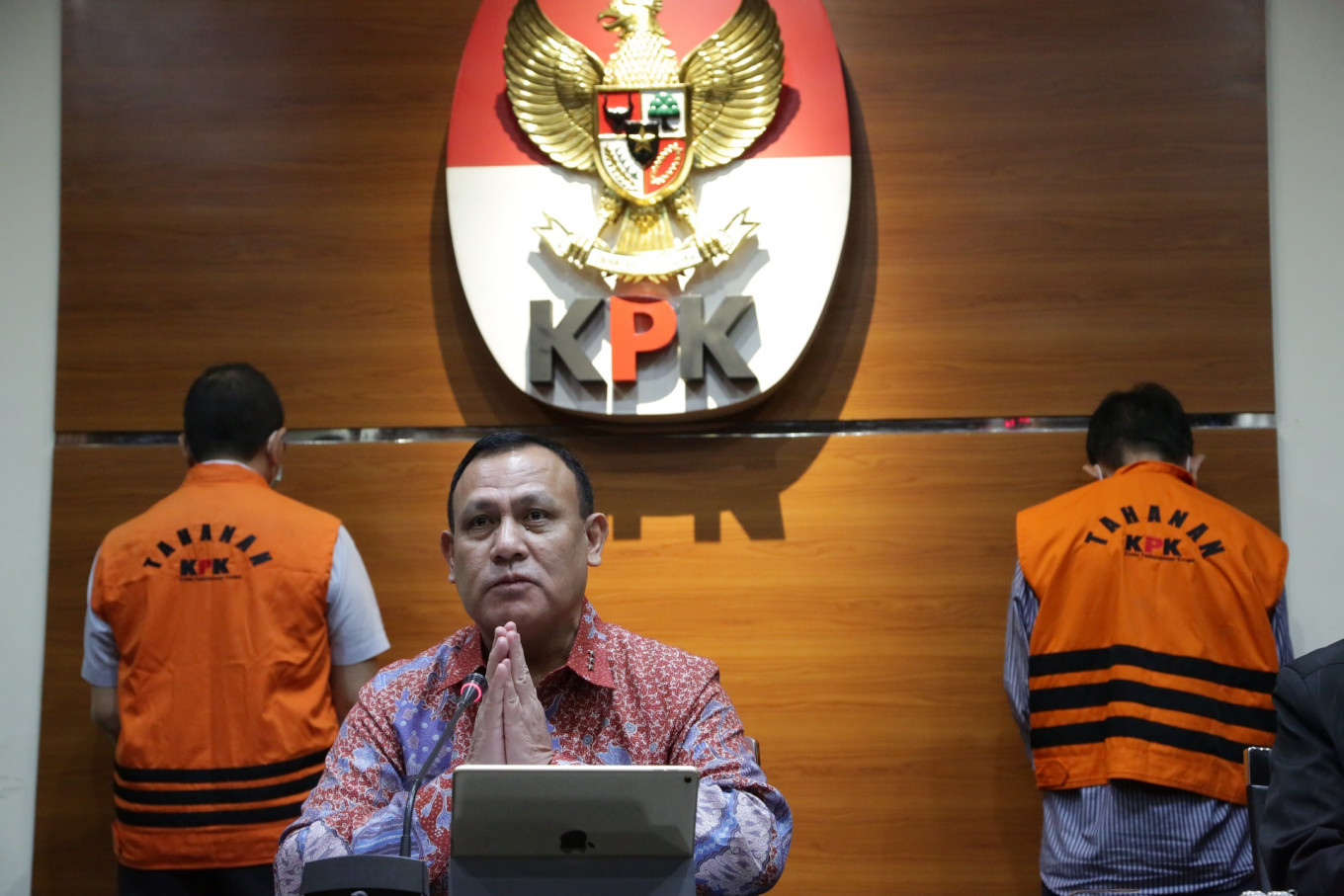Popular Reads
Top Results
Can't find what you're looking for?
View all search resultsPopular Reads
Top Results
Can't find what you're looking for?
View all search resultsWatchdogs' grim report says KPK has 'lost public trust' in six months under Firli
A damning report from two corruption watchdogs reveal the KPK's poor performance in the first half of this year under its new chairman, and that the antigraft body had lost public trust as a direct result of the revised KPK Law.
Change text size
Gift Premium Articles
to Anyone
T
wo of the country's top corruption watchdogs have given the new leadership of the Corruption Eradication Commission (KPK) a red mark for performance in the first half of 2020, citing poor enforcement against special crimes and the many controversies embroiling the commission.
June marks the antigraft body's sixth month under the leadership of chairman Comr. Gen. Firli Bahuri since the police general was installed in December 2019 by President Joko “Jokowi” Widodo.
“The KPK is entering its bleakest days,” the Indonesia Corruption Watch (ICW) and Transparency International Indonesia (TII) wrote in their joint report on the KPK's performance under Firli, published Thursday.
The ICW and TII found that the KPK had significantly declined in its efforts to enforce the Corruption Law under Firli’s chairmanship, recording only two operations between January and June to arrest graft suspects. In comparison, the KPK launched five operations in the same period last year.
Both operations were launched in January, which netted Saiful Ilah, the regent of Sidoarjo in East Java and General Elections Commission (KPU) commissioner Wahyu Setiawan in two separate cases.
The watchdogs also highlighted that the antigraft body had yet to arrest several suspects on its most-wanted list. Among them are Indonesian Democratic Party of Struggle (PDI-P) politician Harun Masiku, who is suspected of bribing Wahyu and Samin Tan, the owner of coal miner Borneo Lumbung Energi who is wanted for allegedly bribing several House of Representatives members in the Riau-1 coal-fired steam power plant (PLTU Riau 1) case.
The ICW and TII also noted that the KPK had not progressed in its investigations of at least 16 high-profile cases that incurred trillions in state losses, including the 1998 Bank Indonesia Liquidity Support (BLBI) bailout case and the 2001 electronic identity (e-ID) card procurement case.
The watchdogs' report also highlights several blunders the KPK in its investigations, including its first operation of the year in late May that involved the arrest of a state official at Jakarta National University (UNJ) for attempted bribery of several officials at the Education and Culture Ministry.
The KPK was criticized at the time for its hastiness in transferring the case to the police, as well as its reluctance to develop the case further to net bigger fish.
ICW and TII lamented the blunders, saying that “the law enforcement instrument is a vital part of creating a deterrent effect against corruptors”.
Read also: 100 days of blunders: Watchdog slams new KPK chairman's performance
The report further notes the KPK’s lack of a new strategy in preventing state losses from corruption, despite Firli's oft-repeated claims that deterring corruption was his primary strategy.
The KPK had stagnated in its programs to prevent graft in strategic sectors like politics and natural resources, the report said. Moreover, the KPK's lack of coordination with other law enforcement authorities and regional administrations had also impeded its corruption prevention efforts.
Meanwhile, several controversial actions had marred the KPK’s efforts, including the dismissal of Rossa Bekti who had led the investigation on the KPU bribery case. The report also cited the antigraft body’s reluctance to update the notices of investigation (SPDPs) on its website.
In particular, the watchdogs lambasted the newly established KPK supervisory board, whose duties include approving or rejecting wiretapping and search-and-seizure warrants.
The report deems the board "ineffective" as it had yet to look into the many public complaints filed against members of the KPK leadership.
"The [KPK's poor performance] cannot be separated from the series of attempts to weaken the KPK by the President and the House of Representatives through the past year, starting from the nomination of new leaders with political interests to the efforts to curb the KPK’s authority [through the revised KPK Law],” ICW and TII said in their report. “[These] measures are beginning to show their results: the KPK is no longer trusted by the public.”
Read also: Indikator poll shows dip in trust, high health focus for govt's COVID-19 response
The watchdogs urged the KPK to improve its performance by being “more objective and independent” in prosecuting cases and ramping up graft prevention efforts.
Responding to the report, KPK acting spokesman Ali Fikri said on Thursday that the commission appreciated the criticisms, and that it had been hard at work this year.
According to the KPK, it had launched 30 investigations this year that implicated 36 suspects and recovered at least Rp 63 billion (US$4.5 million) in state losses from fines, restitution fees and seized assets.
“We have also detained 27 suspects,” Ali said in a statement.
He stressed that the KPK had continued to work on preventing corruption, such as by evaluating the government’s preemployment card program and urging state officials to file their wealth report.










